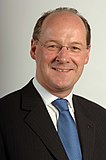The Scottish National Party is a Scottish nationalist and social democratic political party in Scotland. The SNP supports and campaigns for Scottish independence or secession from the United Kingdom and for Scotland's membership of the European Union, with a platform based on civic nationalism. The SNP is the largest political party in Scotland, where it has the most seats in the Scottish Parliament and 45 out of the 59 Scottish seats in the House of Commons at Westminster, and it is the third-largest political party by membership in the United Kingdom, behind the Labour Party and the Conservative Party. The current Scottish National Party leader, Nicola Sturgeon, has served as First Minister of Scotland since 20 November 2014, though she announced her forthcoming resignation from these roles in a press conference on 15 February 2023.
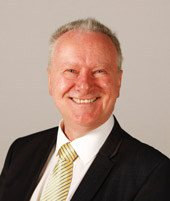
Alexander Neil is a Scottish politician who served as Cabinet Secretary for Health and Wellbeing from 2012 to 2014 and Cabinet Secretary for Social Justice, Communities and Pensioners' Rights from 2014 to 2016. A member of the Scottish National Party (SNP), he was the Member of the Scottish Parliament (MSP) for the Airdrie and Shotts constituency from 2011 until his retirement in 2021.
James Sillars is a Scottish politician and campaigner for Scottish independence. Sillars served as a Labour Party MP for South Ayrshire from 1970 to 1976. He founded and led the pro-Scottish Home Rule Scottish Labour Party in 1976, continuing as MP for South Ayrshire until he lost the seat in 1979.

John Ramsay Swinney is a Scottish politician who has served as Deputy First Minister of Scotland since 2014 and Cabinet Secretary for Covid Recovery since 2021. He was the Leader of the Scottish National Party (SNP) from 2000 to 2004. He served as Education Secretary from 2016 to 2021 and as Finance Secretary from 2007 to 2016. Swinney has also served as the Member of the Scottish Parliament (MSP) for Perthshire North since 2011, having previously represented North Tayside from 1999 to 2011.
Dr William Laurence Wilson is a former Scottish National Party (SNP) politician. He was a regional list Member of the Scottish Parliament (MSP) for the West of Scotland region from 2007 to 2011. He left the SNP in 2017 and now serves as co-convener of the Edinburgh Branch of the Scottish Green Party.

Robert Hardie Bruce Crawford is a Scottish National Party (SNP) politician who served as Cabinet Secretary for Parliamentary Business and Government Strategy from 2011 to 2012, having held the junior ministerial position of Minister for Parliamentary Business from 2007 to 2011. Crawford served as the Member of the Scottish Parliament (MSP) for Stirling from 2007 to 2021, having previously represented the Mid Scotland and Fife region 1999–2007.
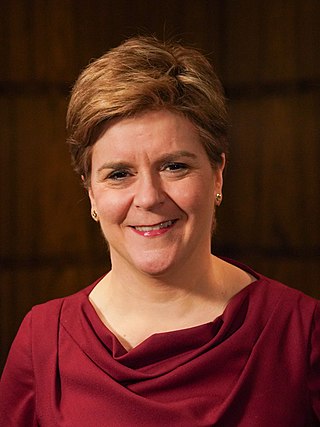
Nicola Ferguson Sturgeon is a Scottish politician serving as First Minister of Scotland and Leader of the Scottish National Party (SNP) since 2014. On 15 February 2023, Sturgeon announced that she would resign as first minister and SNP leader once a new leader is elected. She is the longest-serving first minister of Scotland. She has served a member of the Scottish Parliament (MSP) since 1999, first as an additional member for the Glasgow electoral region, and as the member for Glasgow Southside from 2007.
In Scotland, the Scottish National Party (SNP) is a left social democratic political party which campaigns for Scottish independence. The SNP has controlled Scotland's devolved legislature since the 2007 election as a minority government, and were a majority government from the 2011 election and have been a minority government, since the 2016 election. Its current leader, Nicola Sturgeon, is the First Minister of Scotland.
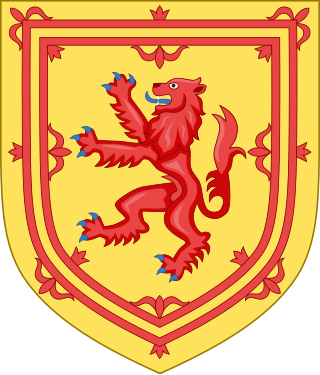
Unionism in Scotland is a political movement which favours the continuation of the political union between Scotland and the other countries of the United Kingdom, and hence is opposed to Scottish independence. Scotland is one of four countries of the United Kingdom which has its own devolved government and Scottish Parliament, as well as representation in the UK Parliament. There are many strands of political Unionism in Scotland, some of which have ties to Unionism and Loyalism in Northern Ireland. The two main political parties in the UK — the Conservatives and Labour — both support Scotland remaining part of the UK.

Scottish Labour is a social democratic political party in Scotland. It is an autonomous section of the UK Labour Party. From their peak of holding 56 of the 129 seats at the first Scottish parliament election in 1999, the Party has lost seats at each Holyrood election, returning 22 MSPs at the 2021 election. The party currently holds one of 59 Scottish seats in the UK House of Commons, with Ian Murray having represented Edinburgh South continuously since 2010.
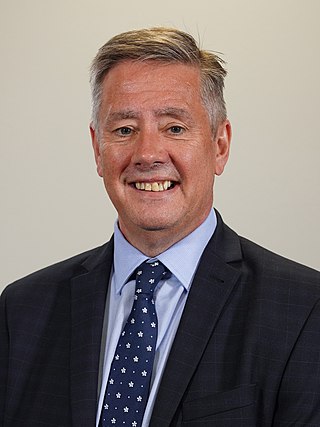
Keith James Brown is a Scottish politician serving as Depute Leader of the Scottish National Party (SNP) since 2018 and Cabinet Secretary for Justice and Veterans since 2021. He is a former Royal Marines commando and has been a Member of the Scottish Parliament (MSP) since 2007, first representing the Ochil constituency from 2007 to 2011, then the Clackmannanshire and Dunblane constituency since 2011.

Alexander Elliot Anderson Salmond is a Scottish politician and economist who served as First Minister of Scotland from 2007 to 2014. A prominent figure on the Scottish nationalist movement, he has served as leader of the Alba Party since 2021. Salmond was leader of the Scottish National Party (SNP), on two occasions, from 1990 to 2000 and from 2004 to 2014. He served as the party's depute leader from 1987 to 1990.

A referendum on Scottish independence from the United Kingdom was held in Scotland on 18 September 2014. The referendum question was, "Should Scotland be an independent country?", which voters answered with "Yes" or "No". The "No" side won with 2,001,926 (55.3%) voting against independence and 1,617,989 (44.7%) voting in favour. The turnout of 84.6% was the highest recorded for an election or referendum in the United Kingdom since the January 1910 general election, which was held before the introduction of universal suffrage.

The 2014 Scottish National Party leadership election was held to choose the leader of the Scottish National Party (SNP) and First Minister of Scotland, following the resignation of Alex Salmond as first minister and leader. Nicola Sturgeon emerged as the only candidate and was elected unopposed as leader of the SNP.

A general election was held in the United Kingdom on 7 May 2015 and all 59 seats in Scotland were contested under the first-past-the-post, single-member district electoral system. Unlike the 2010 general election, where no seats changed party, the Scottish National Party (SNP) won all but three seats in Scotland in an unprecedented landslide victory, gaining a total of 56 seats and taking the largest share of the Scottish vote in sixty years, at approximately 50 per cent. The Labour Party suffered its worst ever election defeat in Scotland, losing 40 of the 41 seats it was defending, including the seats of Scottish Labour leader Jim Murphy and the then Shadow Foreign Secretary Douglas Alexander. The Liberal Democrats lost ten of the eleven seats they were defending, with the then Chief Secretary to the Treasury Danny Alexander and former leader Charles Kennedy losing their seats. The election also saw the worst performance by the Scottish Conservative Party, which received its lowest share of the vote since its creation in 1965, although it retained the one seat that it previously held. In all, 50 of the 59 seats changed party, 49 of them being won by first-time MPs.
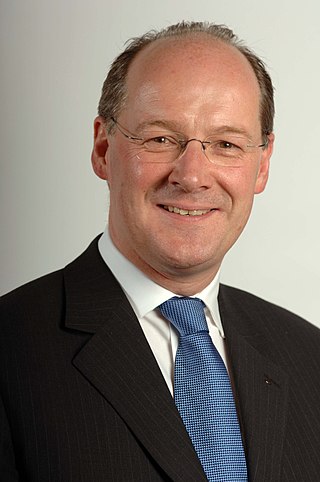
There was a Scottish National Party leadership election to choose the new National Convener of the Scottish National Party (SNP) in 2000. The election followed the announcement by SNP Leader Alex Salmond, that he would be stepping down as SNP leader in 2000. Salmond's announcement came in the face of internal criticism after a series of high-profile fall-outs with party members. Elections were also held for the position of Depute Leader.

The 2004 Scottish National Party leadership election was held following the resignation of John Swinney as leader of the Scottish National Party (SNP). Nominations opened on 22 June, with three candidates nominated, and voting began on 13 August. This was the first election where all party members could vote. The results were announced on 3 September; Alex Salmond defeated Roseanna Cunningham and Michael Russell, with more than 75% of votes.

A second referendum on independence from the United Kingdom (UK) has been proposed by the Scottish Government. An independence referendum was first held on 18 September 2014, with 55% voting "No" to independence. The Scottish Government stated in its white paper for independence that voting Yes was a "once in a generation opportunity to follow a different path, and choose a new and better direction for our nation". Following the "No" vote, the cross party Smith Commission proposed areas that could be devolved to the Scottish Parliament; this led to the passing of the Scotland Act 2016, formalising new devolved policy areas in time for the 2016 Scottish Parliament election campaign.

Alex Salmond's term as first minister of Scotland began on 17 May 2007 when he was formally sworn into office at the Court of Session. It followed his Scottish National Party's win at the 2007 Scottish Parliament election, where his party defeated the incumbent Labour Party by just one seat. Salmond's term ended on 18 November 2014, following his resignation in the aftermath of the Yes campaign's defeat in the 2014 Scottish independence referendum.
The 2023 Scottish National Party leadership election is due to take place to choose the leader of the Scottish National Party (SNP) to succeed Nicola Sturgeon. Sturgeon announced her resignation on 15 February 2023, effective upon the selection of her successor.
